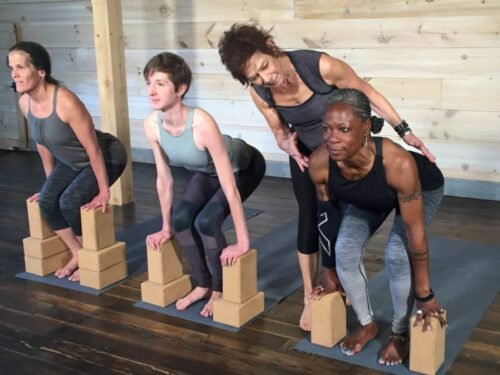Yoga City: Breast Cancer Survivors Find Support
The Connection is the Thing
The first time Susan Bloom saw a reconstructed breast was in the dressing room at Om Yoga. The woman, who was in her sixties, had undergone a double mastectomy, and was happy to explain to Susan what the process was like. Both were attending one of OM’s Women’s Cancer Survivor classes, and this was part of the support—the talking, explaining, sharing. This is only one of the reasons that Bloom says yoga has changed her life. A two-time cancer survivor, she found yoga through a support group at Beth Israel. Now, she is a yogi who practices five to six times a week. Aside from the physical practice, which can help cancer survivors and those undergoing treatment recover strength and flexibility, the emotional support one can experience in a yoga class is a source of solace that Tari Prinster, a teacher at OM and cancer survivor herself, says her students find to be invaluable. Prinster became a certified teacher at OM eight years ago, after searching for yoga support during her own cancer treatment and feeling disappointed in what was available to her. “There wasn’t a lot of education or sensitivity to the specific needs” of the patient community, she says. So she made it her mission to develop a program that was exactly what she was searching for. So far, Prinster has trained over 70 teachers in a certification program at OM, spreading the gospel of understanding, sensitivity, and physical awareness of what recovering bodies can and can’t do while undergoing treatment or recovering after surgery. Most important, she says, is that teachers are able to “separate themselves from their own anxiety about cancer.” “This is about the students,” she says. “This isn’t about them.”For survivors and patients, overcoming the physical challenges presented by breast cancer and breast cancer treatment is a daunting task. Dr. Marisa Weiss, founder of breastcancer.org, an online resource for survivors, and co-author of the critically acclaimed “Living Well Beyond Breast Cancer,” written with her mother Ellen, a breast cancer survivor; says that “cancer patients and survivors face an array of physical challenges and discomforts. The practice of yoga can have a profound therapeutic benefit on women recovering from treatment. In addition to help with relaxation and concentration, yoga has helped many of my patients improve their strength, range of motion, flexibility, balance and posture.”But swelling and pain, a reduced range of motion, and nerve damage from chemotherapy all can affect a student’s physical capability on the mat—and it’s the teacher’s responsibility to understand each student’s abilities on any given day. “The connection with the student is the most important thing,” Prinster says. Often students arrive to class 30 minutes before it begins to chat and prepare. That’s the time when a teacher should find out how they are doing, what they are feeling, and what they need that day.
Yoga isn’t a cure. But using yoga techniques as a tool for recovery from cancer offers patients a point of focus and concentration. In a time filled with uncertainty and discomfort, it is a welcome respite for survivors like Susan Bloom, who says she “didn’t think I’d ever feel fine again” during treatment. Time, they say, heals all wounds. And while Bloom still needs a compression sleeve on her arm to help support her while she practices, she’s more focused now on conquering her headstand than her anxiety about her body—proof that with a little time, and a lot of support, you can shift your perspective in ways you never thought possible.
-Biba Milioto- February 8, 2010

